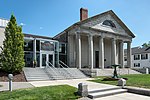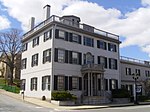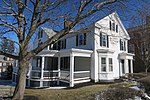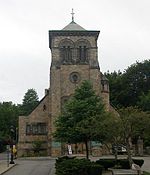Patuxet
Algonquian ethnonymsAlgonquian languagesAlgonquian peoplesHistory of Plymouth County, MassachusettsNative American history of Massachusetts ... and 6 more
Native American tribes in MassachusettsNative Americans connected with Plymouth ColonyPlymouth, MassachusettsPlymouth ColonyThanksgivingWampanoag

The Patuxet were a Native American band of the Wampanoag tribal confederation. They lived primarily in and around modern-day Plymouth, Massachusetts, and were among the first Native Americans encountered by European settlers in the region in the early 17th century. Most of the population subsequently died of epidemic infectious diseases. The last of the Patuxet – an individual named Tisquantum (a.k.a. "Squanto"), who played an important role in the survival of the Pilgrim colony at Plymouth – died in 1622.
Excerpt from the Wikipedia article Patuxet (License: CC BY-SA 3.0, Authors, Images).Patuxet
Court Street, Plymouth
Geographical coordinates (GPS) Address Nearby Places Show on map
Geographical coordinates (GPS)
| Latitude | Longitude |
|---|---|
| N 41.958333333333 ° | E -70.667777777778 ° |
Address
Court Street 56
02360 Plymouth
Massachusetts, United States
Open on Google Maps











